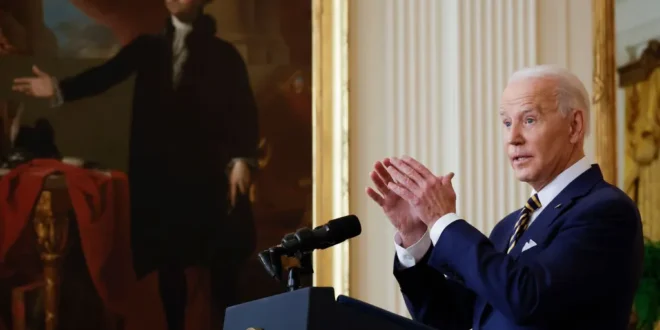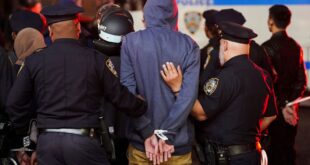John Budis
In seeking re-election, President Joe Biden has been haunted by voters’ concern with his age. Their concern is not strictly medical. Biden’s opponent, Donald Trump, although only three and a half years younger, doesn’t elicit the same worry from voters. According to a March New York Times poll, 73 percent of voters thought Biden was “just too old to be an effective president,” while only 42 percent thought that of Trump. In fact, unless voters are asked specifically about Trump’s age by a pollster, they don’t think about it, but they do think about Biden’s.
Biden’s advisors seem to believe that Biden can dispel these concerns by appearing feisty in speeches and by touting his accomplishments in office, but the problem runs deeper. It begins with Americans’ expectations about how their presidents should appear, and these go back to America’s founding and its conception of the presidency.
In designing a new government, America’s founders rejected Great Britain’s monarchy in favor of a republic. But while insisting otherwise, they mimicked much of Britain’s structure of rule. They divided the national government between a president (aka king or queen) and a bicameral legislature (aka Houses of Lords and Commons). The president was to be elected, but as envisaged by the founders, by electors who would decide independently what candidate to support. The president was an elected monarch, albeit subject to re-election every four years.
As Great Britain’s system evolved, the king or queen has become primarily the head of state—the symbolic representative of the British people—and the duties of running the government have been taken over by the prime minister. The United States has gone, if anything, in the other direction, as the president has absorbed more of the responsibilities of foreign and domestic affairs. The president has taken on the duties of prime minister, but the regal aspect of the job remains very important to the success of American presidents.
Biden has had a problem effectively playing the role of elected monarch. There are two kinds of ways presidents play it effectively, ways that are often combined in the same person. First, presidents can appear as father figures—the nation itself as the ultimate extended family and the president as father. George Washington was described as the “father” of his country, and other presidents who played this role included Andrew Jackson, Abraham Lincoln, Theodore Roosevelt, Franklin D. Roosevelt, Dwight Eisenhower, and Ronald Reagan.
Secondly, they can display a version of what social theorist Max Weber called “charismatic leadership.” The president can appear to possess special gifts of courage, intelligence, wisdom, and eloquence. He can have succeeded spectacularly in war or business. He can be seen as a hero. He can have movie idol looks. Presidents who exercised charismatic leadership include the same cast of father figures, but also Ulysses S. Grant, John F. Kennedy, Bill Clinton, and Barack Obama.
Presidents can be judged on their accomplishments—in their role as prime minister. As Weber noted, if charismatic leaders visibly fail in their stated objectives, they can lose their magical power over their followers. But a president’s success in playing the monarch can also enhance the perception of his accomplishments. In polls of the public and of historians, John F. Kennedy is rated more highly as president that a host of presidents who could boast far greater accomplishments in office, including Jackson, Reagan, Lyndon B. Johnson, and Woodrow Wilson. A recent poll of political scientists ranked Theodore Roosevelt our fourth greatest president, even though his accomplishments in office are dwarfed by those of Wilson, Lyndon Johnson, and Andrew Jackson. Kennedy and Theodore Roosevelt were profoundly charismatic figures—so much so that voters then and generations to follow have overlooked personal flaws and shortcomings in their records that are deemed fatal in other presidents.
If these comparisons seem preposterous, consider the comparison between Theodore Roosevelt and Woodrow Wilson. Scorned today largely because of his reputation as a racist, Wilson was responsible during his two terms for the Federal Reserve System, the Federal Trade Commission (which temporarily at least quieted the debate over antitrust), the income tax, tariff reduction, and the framework of foreign policy that America followed after World War II. Roosevelt, admittedly one of the most colorful and brilliant people to reside in the White House and seen by the contemporary public as a war hero for his exploits in Cuba, was also a champion of Indian removal and Anglo-Saxon racial supremacy and provoked and prosecuted a six-year colonial war in the Philippines.
Biden possesses none of the qualities or the background that have enhanced the presence of other presidents. He is not a father figure. At best, he is “Uncle Joe.” He is not associated with qualities that have characterized father figures—strength, wisdom, and authority. He does not appear to be an energetic leader—a quality that Alexander Hamilton associated with the presidency. He cannot claim any of the attributes of charisma. He was not a war hero, or a wildly successful businessman, but a lifelong politician. He does not appear brilliant and is certainly not eloquent. He does not possess matinee idol looks. His life story, punctuated by personal tragedy, inspires pity and sorrow but not admiration. He is not someone that parents pine for their children to grow up to be. His campaign has tried to portray him as a man of mysterious power by circulating a “Dark Brandon” meme, but to no avail.
His being 81 years old and subject to illness is not a bar to exercising regal leadership. Andrew Jackson, one of America’s most popular presidents, was a few weeks short of 62 when he was inaugurated at a time when life expectancy was about 47. Jackson was affectionately called “old Hickory.” Jackson also suffered from a chronic cough and periodic illnesses that were feared to be fatal. Lincoln was “old Abe,” while Eisenhower suffered two heart attacks in office and spoke in garbled sentences in press conferences. If anything, the cause of Biden’s public problems run in the opposite direction. His lack of regal leadership allows his constituents to focus on his halting gait, his malapropisms, and his occasional forgetfulness. It allows “being old” to become an issue.
Some of the president’s supporters seemed surprised when his feistiness during his State of the Union address failed to noticeably boost his approval ratings. Voters aren’t looking, however, for displays of emotion, but for a commanding presence that intimidates would-be hecklers. (Reagan turned around the 1980 primary with his outburst, “I paid for this microphone, Mr. Green,” when the moderator tried unsuccessfully to silence him.) The president’s supporters have also expected that Biden’s success in getting three major bills through Congress would enhance his popularity, but voters have not seemed to notice. What they did notice, and which has reinforced his image as “old,” was the administration’s calamitous exit from Afghanistan.
I have observed numerous focus groups among swing voters who had backed Trump in 2016 and Biden in 2020. During the groups, the moderators would often ask the members what comes to mind when they thought of Biden. Their answers displayed concern about his age, but in a way that showed how his of lack of perceived leadership had highlighted his physical disability and blinded voters to his accomplishments in office. He was “not tough enough,” “slow,” “too old,” “uninspiring,” “not strong enough to get things done,” and “not strong or forceful enough,” the voters in the focus groups said. “I don’t think he gets anything done.” “He is barely treading water.”
In fact, Biden had already accomplished more in office than most of his predecessors, but it didn’t matter. He didn’t appear to have done so. Instead, he appeared “old.”
That perception has seemed particularly telling among younger and among male voters. It’s important to note that many of these voters were not similarly put off in 2016 and 2020 by Bernie Sanders’ age, even though Sanders is a year older than Biden. It’s a question of a candidate’s commanding presence and charisma. I would guess—I haven’t any specific polling—that Biden’s lack of regal stature accounts for some of his failure to win over black and Hispanic males.
The voters’ concern with Biden’s age does not mean he will lose his re-election bid. Voters have sometimes preferred bland candidates to more charismatic ones. Democrat William Jennings Bryan, famed for his oratory, lost to Republican William McKinley in 1896. Segregationist George Wallace lost three bids for the presidency. Charismatic candidates have devoted followings but by the same token, they can also arouse strong opposition. And other factors can determine voters’ choice of a president.
A case in point is Joe Biden’s defeat of Donald Trump in 2020. Trump was a darkly charismatic candidate and president. He had a regal, commanding presence. He was a stern father figure, but also in his public performances the life of the party. Many voters admired his having become a billionaire. Asked to describe him in one word, those voters who spoke positively of him described him as “strong,” “great,” “determined,” and “leader.” Like other charismatic leaders, he enjoyed a worshipful following that ignored his failings. Even Trump’s opponents implicitly acknowledged his regal bearing by describing him as “arrogant” and “egotistical” and as a would-be dictator. That perception of strength has overridden any concern about his age, even among those who have opposed his candidacy.
But Trump’s brand of charisma also sparked intense opposition. For his critics, Trump’s bloated ego and incivility magnified what were perceived as his failures in office and helped Democrats win back the House of Representatives in 2018 and helped the bland Biden defeat him in 2020. In the 2020 election, voters focused on his seeming incomprehension of the COVID-19 pandemic—epitomized by his gaffe about potentially injecting disinfectants to fight the illness—and ignored his role in speeding the development of a vaccine. In his first debate with Biden, he appeared to be an adolescent bully and extremist.
It could happen again. If Biden is haunted by the complex of concerns summed up in worry about his being old, Trump is haunted by January 6, a history of corruption, a string of indictments, a casual embrace of bigotry, and responsibility for Dobbs v. Jackson. But the concerns about Biden’s age, underlain by his own lack of a regal presence, could also help deny Biden re-election in 2024.
 Geostrategic Media Political Commentary, Analysis, Security, Defense
Geostrategic Media Political Commentary, Analysis, Security, Defense





